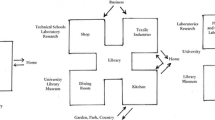Abstract
The essence of ecology is life and its diversity, integrity, openness and coexistence. When one contemplates and analyzes classroom from the perspective of ecology, classroom should contain open-ended and multiple goals instead of a single and pre-set goal; classroom is more flexible, allowing great diversity instead of being narrow-minded, identical and in sole possession. Classroom is characterized by equality, harmony and vigor, instead of being under hegemony, control and being mind-suffocated; it is a place where students as principal parts exchange their minds instead of being a fearful “modern spiritual hell”; classroom is a stage where the vigor of students is stimulated, their nature is started and their colorful self is presented, instead of a knowledge-manufacturing place lacking in variety.
Similar content being viewed by others
References
Wang Rusong 王如松 and Zhou Hong 周鸿, Ren yu shengtaixue 人与生态学 (Man and Ecology), Kunming: Yunnan Renmin Chubanshe, 2004
Yu Mauchang 余谋昌, Shengtai zhexue 生态哲学 (The Philosophy of Ecology), Taiyuan: Shanxi Renmin Chubanshe, 2000, 61–62
Edgar, Morin, Method: Nature of Nature, translated by Wu Hongmiao 吴泓渺, Beijing Daxue Chubanshe, 2002, 212–213
Shi Hanmin 师汉民, “Cong ta zuzhi zhouxiang zi zuzhi” 从它组织走向自组织 (From his organization to self organization), http://www.icad.com.cn/html/2004-4-14/2004414174805.asp, 2004
Wang Xia 汪霞, Kecheng yanjiu: xiandai yu houxiandai 课程研究: 现代与后现代 (Curriculum studies: modern and postmodern), Shanghai Keji Jiaoyu Chubanshe, 2003, 116–123
Teman, Terin, “Seek Commonplace in Difference,” http://lianzai.china.com/books/view.do?BookId=184&chapId=579&noduleId=4051
Giroux H., A. Penna, and W. Pinar, eds, Curriculum and Instruction, California: McCutchan, 1981, 5
Yuan Guiren 袁贵仁, “Suzhi jiaoyu: 21 shiji jiaoyu jiaoxue gaige de qizhi” 素质教育:21纪教育教学改革的旗帜 Quality Education: the Banner of Educational Reform in 21 Century, http://www.edu.cn/20011109/3008949.shtml, 2001
Oliver, Donald W. & Kathleen W. Gershaman, Education, Modernity and Fractured Meaning, Albany, NY: State University of New York Press, 1989, 3
Slattery, P., Curriculum Development in the Postmodern Era, New York: Garland Publishing, 1995, 32
Hu Dongfang 胡东芳, Jiaoyu xin siwei 教育新思维 (New Educational Concepts), Guilin: Guangxi Shifan Daxue Chubanshe, 2003, 22
Author information
Authors and Affiliations
Corresponding author
Additional information
Translated from Global Education, 2005:5
Rights and permissions
About this article
Cite this article
Wang, X. Is our Classroom an Ecological Place?. Front. Educ. China 1, 56–69 (2006). https://doi.org/10.1007/s11516-005-0002-z
Issue Date:
DOI: https://doi.org/10.1007/s11516-005-0002-z




